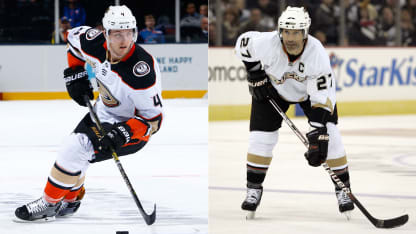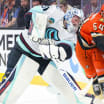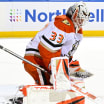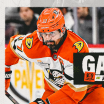It wasn't long after Cam Fowler was drafted by the Ducks in June 2010 when he needed to find a place to live in Orange County. As a baby-faced 18-year-old, Fowler earned a roster spot out of training camp and made his NHL debut shortly after. Adapting to the NHL game is hard enough, let alone all the other responsibilities that come with living on your own as a first-year pro.
Living with the Niedermayers Meant Everything to Fowler

To ease the transition, Scott Niedermayer and his family opened their doors to the young Fowler, giving them a fifth "son" in the house. Niedermayer, who later today will become the third player in Ducks franchise history to have his jersey retired, lived with a family when he was a rookie with the New Jersey Devils. "It was something I thought worked pretty well for me," Niedermayer said, in this
from the 2010-11 season - Fowler's first as a Duck. "Adapting to a pro game, you have a lot on your plate. It was a good thing for me back then."
Now a 27-year-old man, Fowler had a chance to re-watch the video at a recent practice. He remembers it well. "Oh yeah, I remember this," he said with a smile. "It brings back some memories for sure. Seems like a long time ago. Fresh face."
Fowler's relationship with Niedermayer was unique in the sense that he had one of the greatest defensemen of all time mentoring him on and off the ice. Living in the Niedermayer house allowed for him to focus solely on hockey.
"Scott made the transition into the NHL a lot easier for me," Fowler said. "I had a bed to sleep in. I always had meals cooked and laundry done. All the stuff you don't really think about as an 18-year-old. They made it so easy for me."
Fowler ended up having a strong rookie season. He finished second among Ducks defensemen in scoring (behind Lubomir Visnovsky) with 40 points (10g/30a) in 76 games. His 40 points during the 2010-11 campaign still stand as a career high.
"I had one of the best defensemen of all time I could lean on for anything hockey related," Fowler said. "Very thankful to him and his family for what they did for me, and allowing me to make the transition a lot easier."
When Fowler had questions, Niedermayer had answers. He was, after all, the first player in hockey history to win a Stanley Cup, Olympic gold medal, World Championship, World Cup, Memorial Cup and World Junior title. Niedermayer is also the only player in hockey history to have won a combination of four Stanley Cups and two Olympic gold medals. A 2003-04 James Norris Memorial Trophy winner as the NHL's top defenseman, Niedermayer was named an NHL All-Star six times during his NHL career (1998, 2001, 2004, 2007, 2008 and 2009).
Much like his personality, Niedermayer was a quiet leader, says Fowler. "For anyone who knows him, he doesn't spill his wisdom onto you. He's not looking to ruffle any feathers. He's very soft spoken. But there were times when he'd point something out, too. A lot of it was me going to him. I had a lot of questions. How do I approach the game? I try to have a similar demeanor. I try to play with a lot of poise and be calm, so how do I do that while also making sure I compete every shift? How do I stay engaged? How do I get myself physically ready every night? How do I eat properly? All that stuff. Pretty much anything that came to mind, I'd try to go to him with that."
Growing up in the Detroit area, Fowler wasn't able to watch Niedermayer as much as, say, Hall-of-Fame defenseman (and Red Wings legend) Nicklas Lidstrom. He didn't get a chance to skate with him either, as Niedermayer announced his retirement from the NHL three days before Fowler was drafted by the Ducks. But over time, Fowler became aware of Niedermayer's legacy.
"A lot of people talk about how effortless he made it look," Fowler said. "He could be the first guy in on the rush and the first guy back on defense all on the same shift, and do it without breaking a sweat. He knew his game. He used his skating to his advantage. He wasn't going to overpower people with his size or strength, but he was going to outskate you. Every loose puck he was the first one to it. The amount of efficiency he got out of his skating and his stride. He was able to cover all sorts of ice without really making it that difficult on him. He had that ability to control the game and do it all with his skating and smarts, a lot like Lidstrom. To me, he defined that role as a smooth-skating smart defenseman."
Looking back at his year living with the Niedermayers, Fowler says he is forever grateful. As a nine-year veteran in the NHL and one of the leaders on the Ducks, Fowler says he'd love to open his house to a rookie, if the opportunity arises.
"My fiancée [Jasmine] and I have already talked about that," he said. "You're living your dream as an 18-year-old when you're in the NHL, but there are so many things away from the rink you have to be aware of. If you know you have a consistent roof over your head, and people there that can help you, it makes a world of difference. I can't imagine how my transition would've been if I didn't have that.
"If someone is in that position, as an 18-year-old, and they need a place to stay and they're going to be on the team, I'd be one of the first ones to step up and talk to someone about getting them in," Fowler said. "As long as everything made sense for us, depending on where we're at with our family. You have to make sure the situation would be right, and they would be comfortable. Just knowing the impact it made on me, just offering that to somebody makes a world of difference."
The impact Niedermayer had on Fowler extends far beyond the confines of a hockey rink.
"There is a lot of stuff about him, too, as a person that you can look to as a leader. He had that calm, quiet leadership. All in all, just a great overall role model and somebody you could admire."

















